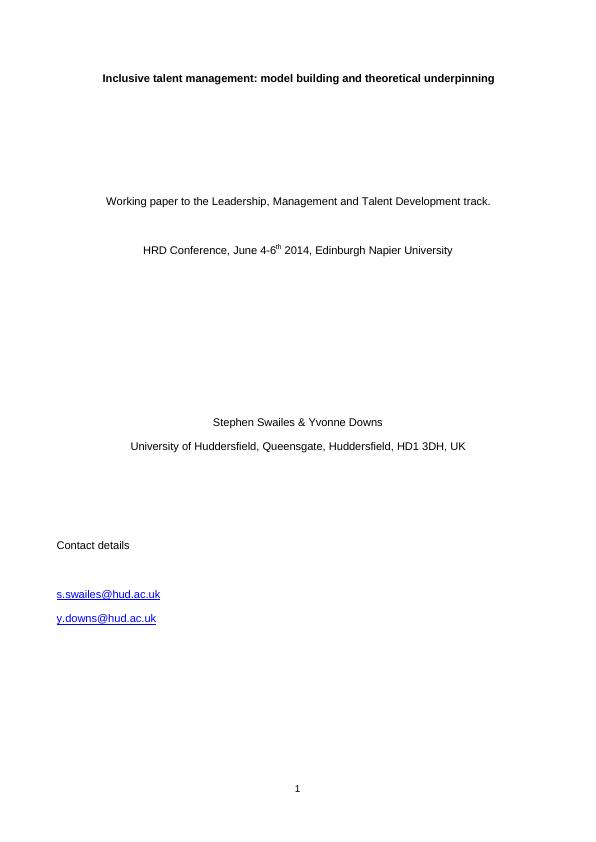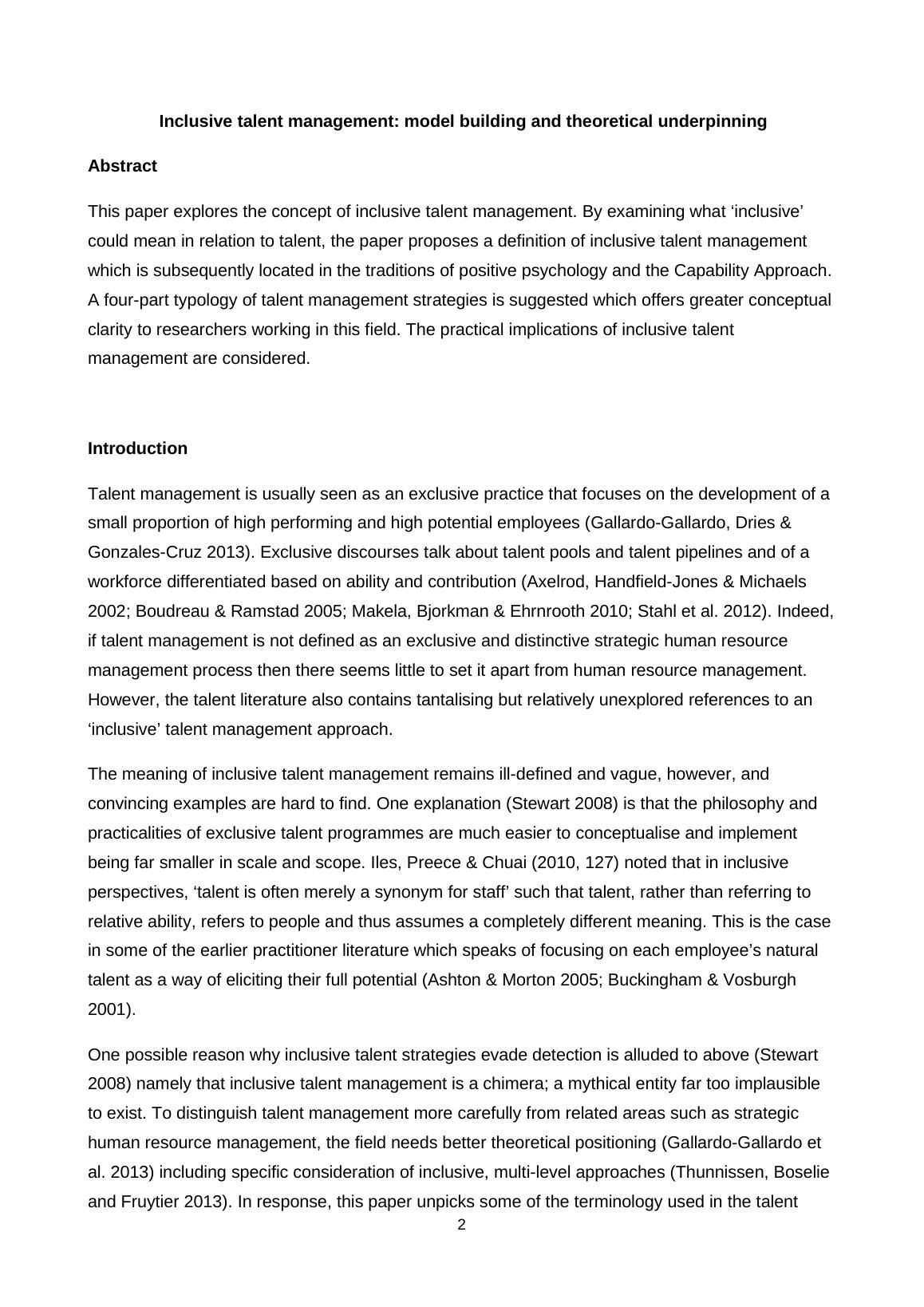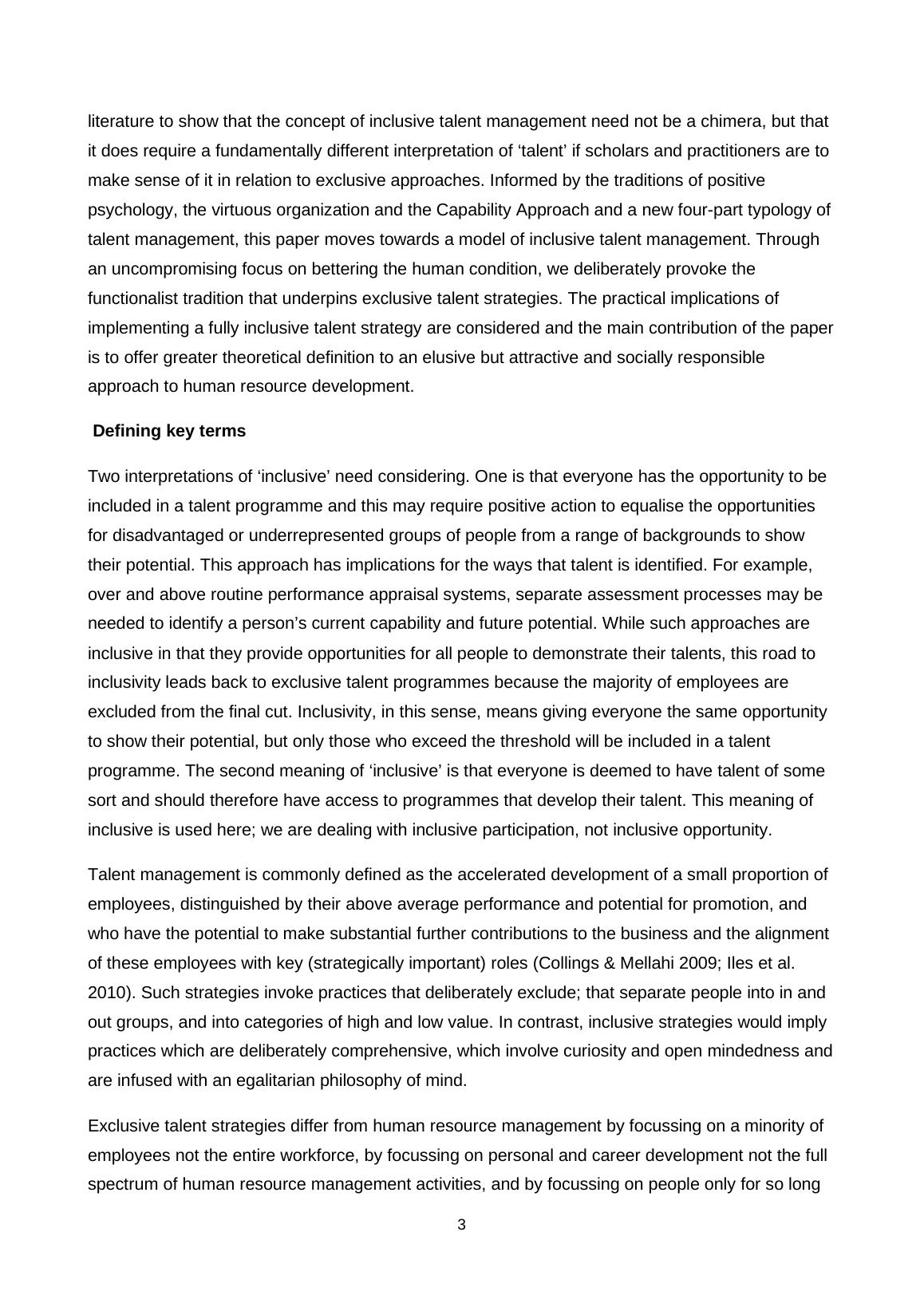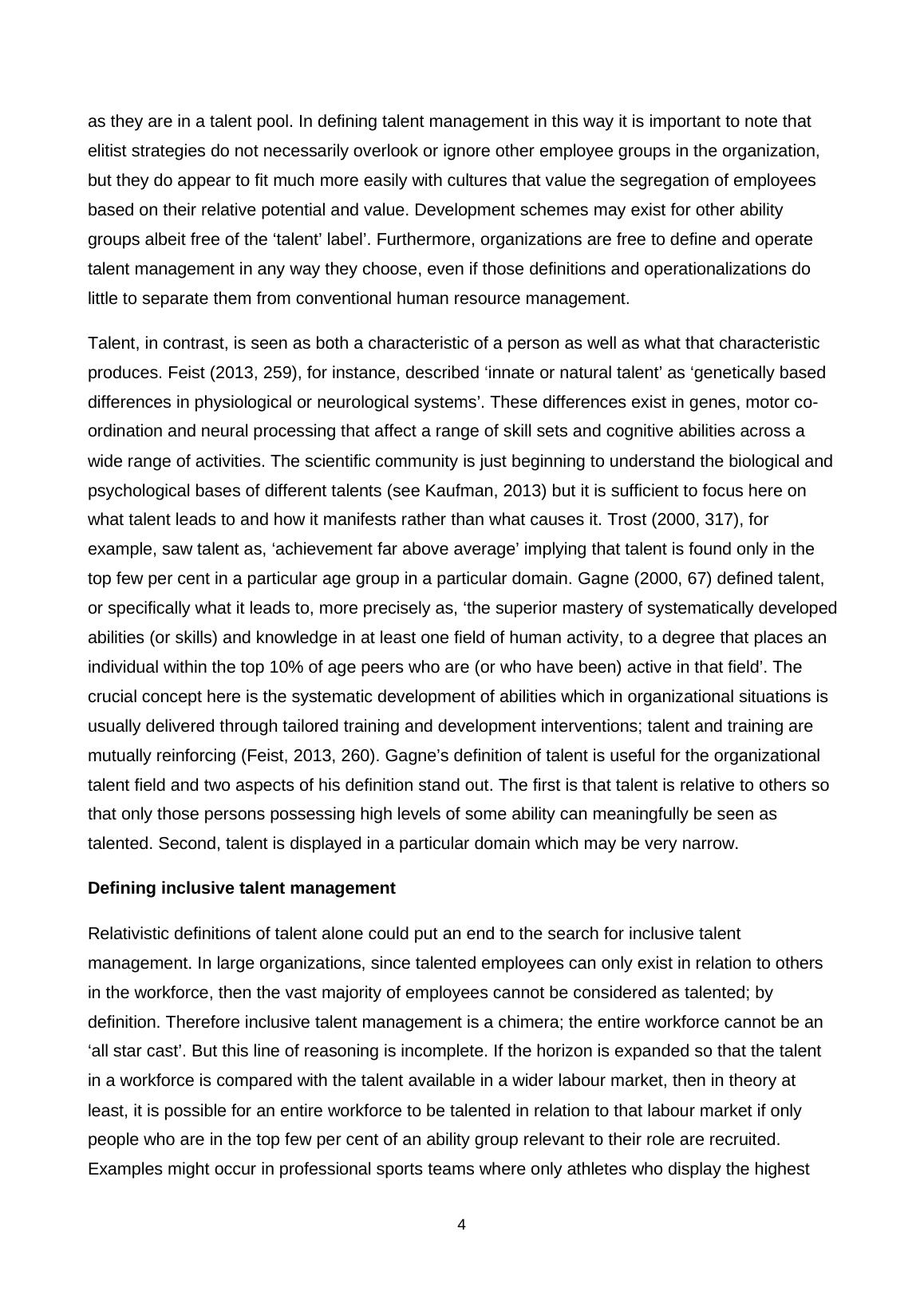Inclusive Talent Management
Added on 2021-07-20
16 Pages7958 Words75 Views
1
Inclusive talent management: model building and theoretical underpinning
Working paper to the Leadership, Management and Talent Development track.
HRD Conference, June 4-6th 2014, Edinburgh Napier University
Stephen Swailes & Yvonne Downs
University of Huddersfield, Queensgate, Huddersfield, HD1 3DH, UK
Contact details
s.swailes@hud.ac.uk
y.downs@hud.ac.uk
Inclusive talent management: model building and theoretical underpinning
Working paper to the Leadership, Management and Talent Development track.
HRD Conference, June 4-6th 2014, Edinburgh Napier University
Stephen Swailes & Yvonne Downs
University of Huddersfield, Queensgate, Huddersfield, HD1 3DH, UK
Contact details
s.swailes@hud.ac.uk
y.downs@hud.ac.uk

2
Inclusive talent management: model building and theoretical underpinning
Abstract
This paper explores the concept of inclusive talent management. By examining what ‘inclusive’
could mean in relation to talent, the paper proposes a definition of inclusive talent management
which is subsequently located in the traditions of positive psychology and the Capability Approach.
A four-part typology of talent management strategies is suggested which offers greater conceptual
clarity to researchers working in this field. The practical implications of inclusive talent
management are considered.
Introduction
Talent management is usually seen as an exclusive practice that focuses on the development of a
small proportion of high performing and high potential employees (Gallardo-Gallardo, Dries &
Gonzales-Cruz 2013). Exclusive discourses talk about talent pools and talent pipelines and of a
workforce differentiated based on ability and contribution (Axelrod, Handfield-Jones & Michaels
2002; Boudreau & Ramstad 2005; Makela, Bjorkman & Ehrnrooth 2010; Stahl et al. 2012). Indeed,
if talent management is not defined as an exclusive and distinctive strategic human resource
management process then there seems little to set it apart from human resource management.
However, the talent literature also contains tantalising but relatively unexplored references to an
‘inclusive’ talent management approach.
The meaning of inclusive talent management remains ill-defined and vague, however, and
convincing examples are hard to find. One explanation (Stewart 2008) is that the philosophy and
practicalities of exclusive talent programmes are much easier to conceptualise and implement
being far smaller in scale and scope. Iles, Preece & Chuai (2010, 127) noted that in inclusive
perspectives, ‘talent is often merely a synonym for staff’ such that talent, rather than referring to
relative ability, refers to people and thus assumes a completely different meaning. This is the case
in some of the earlier practitioner literature which speaks of focusing on each employee’s natural
talent as a way of eliciting their full potential (Ashton & Morton 2005; Buckingham & Vosburgh
2001).
One possible reason why inclusive talent strategies evade detection is alluded to above (Stewart
2008) namely that inclusive talent management is a chimera; a mythical entity far too implausible
to exist. To distinguish talent management more carefully from related areas such as strategic
human resource management, the field needs better theoretical positioning (Gallardo-Gallardo et
al. 2013) including specific consideration of inclusive, multi-level approaches (Thunnissen, Boselie
and Fruytier 2013). In response, this paper unpicks some of the terminology used in the talent
Inclusive talent management: model building and theoretical underpinning
Abstract
This paper explores the concept of inclusive talent management. By examining what ‘inclusive’
could mean in relation to talent, the paper proposes a definition of inclusive talent management
which is subsequently located in the traditions of positive psychology and the Capability Approach.
A four-part typology of talent management strategies is suggested which offers greater conceptual
clarity to researchers working in this field. The practical implications of inclusive talent
management are considered.
Introduction
Talent management is usually seen as an exclusive practice that focuses on the development of a
small proportion of high performing and high potential employees (Gallardo-Gallardo, Dries &
Gonzales-Cruz 2013). Exclusive discourses talk about talent pools and talent pipelines and of a
workforce differentiated based on ability and contribution (Axelrod, Handfield-Jones & Michaels
2002; Boudreau & Ramstad 2005; Makela, Bjorkman & Ehrnrooth 2010; Stahl et al. 2012). Indeed,
if talent management is not defined as an exclusive and distinctive strategic human resource
management process then there seems little to set it apart from human resource management.
However, the talent literature also contains tantalising but relatively unexplored references to an
‘inclusive’ talent management approach.
The meaning of inclusive talent management remains ill-defined and vague, however, and
convincing examples are hard to find. One explanation (Stewart 2008) is that the philosophy and
practicalities of exclusive talent programmes are much easier to conceptualise and implement
being far smaller in scale and scope. Iles, Preece & Chuai (2010, 127) noted that in inclusive
perspectives, ‘talent is often merely a synonym for staff’ such that talent, rather than referring to
relative ability, refers to people and thus assumes a completely different meaning. This is the case
in some of the earlier practitioner literature which speaks of focusing on each employee’s natural
talent as a way of eliciting their full potential (Ashton & Morton 2005; Buckingham & Vosburgh
2001).
One possible reason why inclusive talent strategies evade detection is alluded to above (Stewart
2008) namely that inclusive talent management is a chimera; a mythical entity far too implausible
to exist. To distinguish talent management more carefully from related areas such as strategic
human resource management, the field needs better theoretical positioning (Gallardo-Gallardo et
al. 2013) including specific consideration of inclusive, multi-level approaches (Thunnissen, Boselie
and Fruytier 2013). In response, this paper unpicks some of the terminology used in the talent

3
literature to show that the concept of inclusive talent management need not be a chimera, but that
it does require a fundamentally different interpretation of ‘talent’ if scholars and practitioners are to
make sense of it in relation to exclusive approaches. Informed by the traditions of positive
psychology, the virtuous organization and the Capability Approach and a new four-part typology of
talent management, this paper moves towards a model of inclusive talent management. Through
an uncompromising focus on bettering the human condition, we deliberately provoke the
functionalist tradition that underpins exclusive talent strategies. The practical implications of
implementing a fully inclusive talent strategy are considered and the main contribution of the paper
is to offer greater theoretical definition to an elusive but attractive and socially responsible
approach to human resource development.
Defining key terms
Two interpretations of ‘inclusive’ need considering. One is that everyone has the opportunity to be
included in a talent programme and this may require positive action to equalise the opportunities
for disadvantaged or underrepresented groups of people from a range of backgrounds to show
their potential. This approach has implications for the ways that talent is identified. For example,
over and above routine performance appraisal systems, separate assessment processes may be
needed to identify a person’s current capability and future potential. While such approaches are
inclusive in that they provide opportunities for all people to demonstrate their talents, this road to
inclusivity leads back to exclusive talent programmes because the majority of employees are
excluded from the final cut. Inclusivity, in this sense, means giving everyone the same opportunity
to show their potential, but only those who exceed the threshold will be included in a talent
programme. The second meaning of ‘inclusive’ is that everyone is deemed to have talent of some
sort and should therefore have access to programmes that develop their talent. This meaning of
inclusive is used here; we are dealing with inclusive participation, not inclusive opportunity.
Talent management is commonly defined as the accelerated development of a small proportion of
employees, distinguished by their above average performance and potential for promotion, and
who have the potential to make substantial further contributions to the business and the alignment
of these employees with key (strategically important) roles (Collings & Mellahi 2009; Iles et al.
2010). Such strategies invoke practices that deliberately exclude; that separate people into in and
out groups, and into categories of high and low value. In contrast, inclusive strategies would imply
practices which are deliberately comprehensive, which involve curiosity and open mindedness and
are infused with an egalitarian philosophy of mind.
Exclusive talent strategies differ from human resource management by focussing on a minority of
employees not the entire workforce, by focussing on personal and career development not the full
spectrum of human resource management activities, and by focussing on people only for so long
literature to show that the concept of inclusive talent management need not be a chimera, but that
it does require a fundamentally different interpretation of ‘talent’ if scholars and practitioners are to
make sense of it in relation to exclusive approaches. Informed by the traditions of positive
psychology, the virtuous organization and the Capability Approach and a new four-part typology of
talent management, this paper moves towards a model of inclusive talent management. Through
an uncompromising focus on bettering the human condition, we deliberately provoke the
functionalist tradition that underpins exclusive talent strategies. The practical implications of
implementing a fully inclusive talent strategy are considered and the main contribution of the paper
is to offer greater theoretical definition to an elusive but attractive and socially responsible
approach to human resource development.
Defining key terms
Two interpretations of ‘inclusive’ need considering. One is that everyone has the opportunity to be
included in a talent programme and this may require positive action to equalise the opportunities
for disadvantaged or underrepresented groups of people from a range of backgrounds to show
their potential. This approach has implications for the ways that talent is identified. For example,
over and above routine performance appraisal systems, separate assessment processes may be
needed to identify a person’s current capability and future potential. While such approaches are
inclusive in that they provide opportunities for all people to demonstrate their talents, this road to
inclusivity leads back to exclusive talent programmes because the majority of employees are
excluded from the final cut. Inclusivity, in this sense, means giving everyone the same opportunity
to show their potential, but only those who exceed the threshold will be included in a talent
programme. The second meaning of ‘inclusive’ is that everyone is deemed to have talent of some
sort and should therefore have access to programmes that develop their talent. This meaning of
inclusive is used here; we are dealing with inclusive participation, not inclusive opportunity.
Talent management is commonly defined as the accelerated development of a small proportion of
employees, distinguished by their above average performance and potential for promotion, and
who have the potential to make substantial further contributions to the business and the alignment
of these employees with key (strategically important) roles (Collings & Mellahi 2009; Iles et al.
2010). Such strategies invoke practices that deliberately exclude; that separate people into in and
out groups, and into categories of high and low value. In contrast, inclusive strategies would imply
practices which are deliberately comprehensive, which involve curiosity and open mindedness and
are infused with an egalitarian philosophy of mind.
Exclusive talent strategies differ from human resource management by focussing on a minority of
employees not the entire workforce, by focussing on personal and career development not the full
spectrum of human resource management activities, and by focussing on people only for so long

4
as they are in a talent pool. In defining talent management in this way it is important to note that
elitist strategies do not necessarily overlook or ignore other employee groups in the organization,
but they do appear to fit much more easily with cultures that value the segregation of employees
based on their relative potential and value. Development schemes may exist for other ability
groups albeit free of the ‘talent’ label’. Furthermore, organizations are free to define and operate
talent management in any way they choose, even if those definitions and operationalizations do
little to separate them from conventional human resource management.
Talent, in contrast, is seen as both a characteristic of a person as well as what that characteristic
produces. Feist (2013, 259), for instance, described ‘innate or natural talent’ as ‘genetically based
differences in physiological or neurological systems’. These differences exist in genes, motor co-
ordination and neural processing that affect a range of skill sets and cognitive abilities across a
wide range of activities. The scientific community is just beginning to understand the biological and
psychological bases of different talents (see Kaufman, 2013) but it is sufficient to focus here on
what talent leads to and how it manifests rather than what causes it. Trost (2000, 317), for
example, saw talent as, ‘achievement far above average’ implying that talent is found only in the
top few per cent in a particular age group in a particular domain. Gagne (2000, 67) defined talent,
or specifically what it leads to, more precisely as, ‘the superior mastery of systematically developed
abilities (or skills) and knowledge in at least one field of human activity, to a degree that places an
individual within the top 10% of age peers who are (or who have been) active in that field’. The
crucial concept here is the systematic development of abilities which in organizational situations is
usually delivered through tailored training and development interventions; talent and training are
mutually reinforcing (Feist, 2013, 260). Gagne’s definition of talent is useful for the organizational
talent field and two aspects of his definition stand out. The first is that talent is relative to others so
that only those persons possessing high levels of some ability can meaningfully be seen as
talented. Second, talent is displayed in a particular domain which may be very narrow.
Defining inclusive talent management
Relativistic definitions of talent alone could put an end to the search for inclusive talent
management. In large organizations, since talented employees can only exist in relation to others
in the workforce, then the vast majority of employees cannot be considered as talented; by
definition. Therefore inclusive talent management is a chimera; the entire workforce cannot be an
‘all star cast’. But this line of reasoning is incomplete. If the horizon is expanded so that the talent
in a workforce is compared with the talent available in a wider labour market, then in theory at
least, it is possible for an entire workforce to be talented in relation to that labour market if only
people who are in the top few per cent of an ability group relevant to their role are recruited.
Examples might occur in professional sports teams where only athletes who display the highest
as they are in a talent pool. In defining talent management in this way it is important to note that
elitist strategies do not necessarily overlook or ignore other employee groups in the organization,
but they do appear to fit much more easily with cultures that value the segregation of employees
based on their relative potential and value. Development schemes may exist for other ability
groups albeit free of the ‘talent’ label’. Furthermore, organizations are free to define and operate
talent management in any way they choose, even if those definitions and operationalizations do
little to separate them from conventional human resource management.
Talent, in contrast, is seen as both a characteristic of a person as well as what that characteristic
produces. Feist (2013, 259), for instance, described ‘innate or natural talent’ as ‘genetically based
differences in physiological or neurological systems’. These differences exist in genes, motor co-
ordination and neural processing that affect a range of skill sets and cognitive abilities across a
wide range of activities. The scientific community is just beginning to understand the biological and
psychological bases of different talents (see Kaufman, 2013) but it is sufficient to focus here on
what talent leads to and how it manifests rather than what causes it. Trost (2000, 317), for
example, saw talent as, ‘achievement far above average’ implying that talent is found only in the
top few per cent in a particular age group in a particular domain. Gagne (2000, 67) defined talent,
or specifically what it leads to, more precisely as, ‘the superior mastery of systematically developed
abilities (or skills) and knowledge in at least one field of human activity, to a degree that places an
individual within the top 10% of age peers who are (or who have been) active in that field’. The
crucial concept here is the systematic development of abilities which in organizational situations is
usually delivered through tailored training and development interventions; talent and training are
mutually reinforcing (Feist, 2013, 260). Gagne’s definition of talent is useful for the organizational
talent field and two aspects of his definition stand out. The first is that talent is relative to others so
that only those persons possessing high levels of some ability can meaningfully be seen as
talented. Second, talent is displayed in a particular domain which may be very narrow.
Defining inclusive talent management
Relativistic definitions of talent alone could put an end to the search for inclusive talent
management. In large organizations, since talented employees can only exist in relation to others
in the workforce, then the vast majority of employees cannot be considered as talented; by
definition. Therefore inclusive talent management is a chimera; the entire workforce cannot be an
‘all star cast’. But this line of reasoning is incomplete. If the horizon is expanded so that the talent
in a workforce is compared with the talent available in a wider labour market, then in theory at
least, it is possible for an entire workforce to be talented in relation to that labour market if only
people who are in the top few per cent of an ability group relevant to their role are recruited.
Examples might occur in professional sports teams where only athletes who display the highest

End of preview
Want to access all the pages? Upload your documents or become a member.
